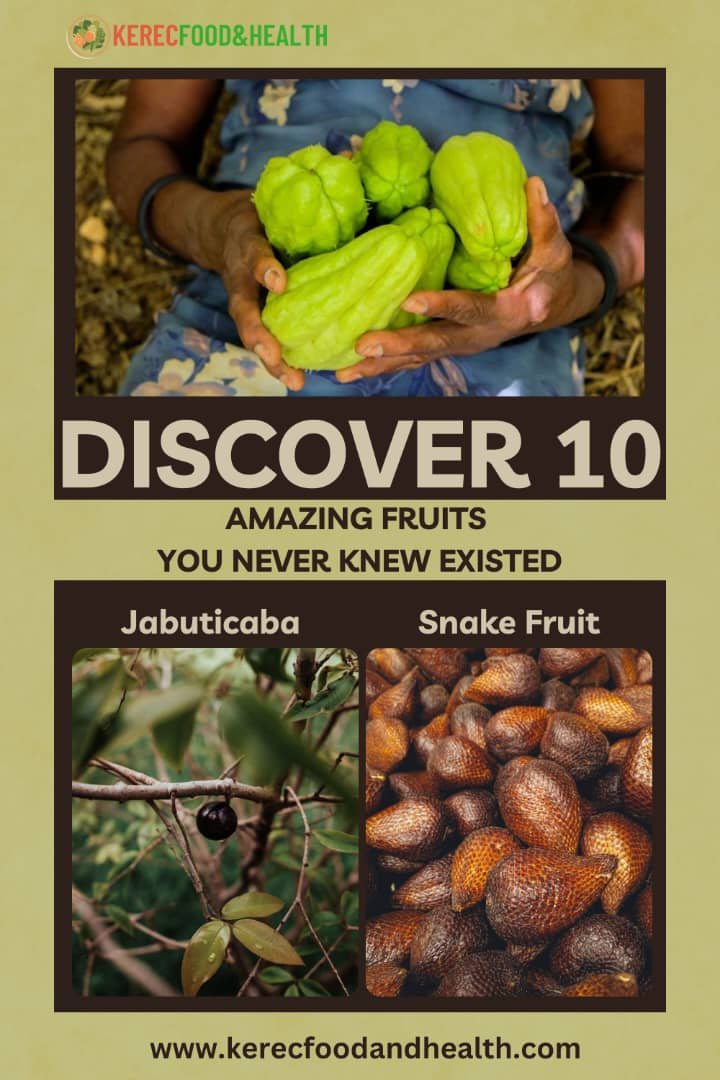When we think of fruits, we often picture bananas, apples, and oranges. However, there’s a whole world of exotic, unusual fruits that many people have yet to explore. Packed with unique flavors, nutrients, and medicinal properties, these fruits bring variety and excitement to our diets. Let’s dive into 10 fascinating fruits you probably never knew existed!
1. Jabuticaba Fruits
Known as the Brazilian grape tree, jabuticaba grows in South America. Surprisingly, its grape-like fruits grow directly on the tree trunk, making it appear as though the trunk is covered in purple pearls. With a sweet yet slightly tart flavor, jabuticaba is often turned into jellies, wines, and liqueurs.
Fun Fact: The skin of jabuticaba contains powerful antioxidants, which are believed to help prevent cancer.
2. Calamondin Fruits
Moving to Southeast Asia, we find calamondin, a small, sour citrus fruit that looks like a miniature orange. Besides being a popular flavor booster in many dishes, calamondin is also rich in vitamin C, making it a natural choice for medicinal uses.
Uses: Calamondin works well in marinades and salad dressings and also acts as a natural skin cleanser due to its acidity.
3. Salak (Snake Fruit)
Next, we head to Indonesia, where salak—also called snake fruit—gets its name from its unique scaly, reddish-brown skin. Inside, its crunchy flesh offers a tangy-sweet taste that’s high in fiber and great for digestion.
Interesting Fact: Southeast Asia refers to salak as the “memory fruit” because its high potassium and pectin content is thought to boost brain function.
4. Chayote Fruit
In Latin America, chayote, also known as vegetable pear or mirliton, adds a mild flavor to various dishes. Although typically cooked, this green, pear-shaped fruit is a fantastic source of vitamin C, B vitamins, and potassium.
Uses: Chayote is versatile in the kitchen and can be roasted, added to stews, or even stuffed with meats and vegetables.
5. Mangosteen Fruits
Widely regarded as the “queen of fruits,” mangosteen from Southeast Asia hides its juicy, sweet-sour pulp within a thick purple rind. Rich in xanthones, which have anti-inflammatory and antioxidant properties, mangosteen offers a taste unlike any other.
Health Benefits: Mangosteen may help reduce inflammation and support heart health.
6. Rambutan Fruits
In Malaysia, the bright red, spiky rambutan catches everyone’s attention. Resembling lychee in taste, rambutan offers a slightly sweet and sour flavor. Not only is it delicious, but it’s also a rich in fiber, vitamin C, and iron.
Unique Feature: Although its spiky exterior looks intimidating, cracking it open reveals a soft, delicious fruit inside.
7. Sapodilla Fruit
Central America brings us sapodilla, a tropical fruit with a rough, brown skin that hides a soft, caramel-like flesh inside. This sweet fruit provides an excellent source of vitamins A and C, along with dietary fiber.
Fun Fact: The sapodilla tree’s sap once served as a primary ingredient in chewing gum.
8. Longan Fruits
Known as the “dragon’s eye,” longan is a small, translucent fruit with a musky aroma. Native to southern Asia, longan tastes sweet and juicy, making it a favorite in both culinary and traditional herbal medicine.
Uses: In Asia, people often use longan to prepare soothing desserts and refreshing drinks.
9. Baobab Fruit
Originating from Africa, the baobab tree—often called the “Tree of Life”—produces a tangy, nutrient-rich fruit. Full of vitamin C, fiber, and antioxidants, baobab pulp can be dried into powder form for use in smoothies and health products.
Health Benefits: Known for its immune-boosting and blood-sugar-balancing effects, baobab is becoming a popular superfood.
10. Cupuacu Fruits
Finally, from the Amazon rainforest, we find cupuacu, a fruit related to cacao with a flavor described as a mix of chocolate and pineapple. Rich in antioxidants, vitamins, and healthy fats, cupuacu is great for supporting skin health and the immune system.
Fun Fact: Sometimes called “the pharmacy in a fruit,” cupuacu is celebrated for its wide-ranging health benefits.
Final Thoughts
These incredible fruits reveal just how diverse and exciting the world of fruits truly is. Each offers unique flavors and health benefits, so the next time you’re at a specialty store or traveling abroad, be on the lookout for these hidden gems. Embrace the opportunity to try something new, and you may discover a favorite flavor from the exotic world of fruits!




Pingback: How Osage Orange Health Benefits Can Improve Your Health